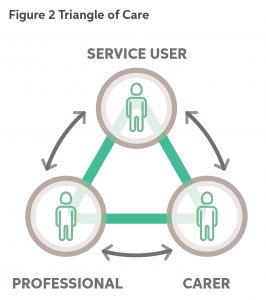Idea #6 Needs as carers
What’s the idea?
Partners or other family members may find themselves providing a significant amount of care for the mother whilst she is experiencing mental health difficulties. For example, they may need time off work, help with childcare, or support with the costs of transport.
The term ‘carer’ may carry negative connotations, which may prevent some partners and other family members from identifying as ‘carers’, but recognising their role as a carer may be a way to access additional support.
Partners or other family members may be eligible for a carer’s assessment if:
- they are providing necessary care to the mother because of her mental health disorder, and
- the caring role has an effect on them (including on their physical or mental health, their work or their ability to look after their children), and
- there is (or is likely to be) a significant impact on their wellbeing.
More information about carer’s assessments can be found on nhs.uk.
Why implement it?
- Being a carer can have many practical, emotional and financial implications.
- Carers are entitled to support in their own right, which may help alleviate pressures of this role.
Actions to consider
- Support partners and other family members to recognise themselves as carers, where appropriate.
- Provide information to partners and other family about how they can access a carer’s assessment.
- Find out what support is available from local authority and voluntary carers organisations, and the links you can make with them.
The Triangle of Care
The Triangle of Care [ref. 31] standards describe good practice on involving partners and other family members in the care planning and treatment of people with mental health disorders.
The Triangle of Care states six key standards, all of which are relevant for the perinatal period:
- carers and the essential role they play are identified at first contact or as soon as possible thereafter
- staff are ‘carer aware’ and trained in carer engagement strategies
- policy and practice protocols regarding confidentiality and sharing information are in place
- defined post(s) responsible for carers are in place
- a carer introduction to the service and staff is available, with a relevant range of information across the care pathway
- a range of carer support services is available.
Practice tips: box 8
Identifying as a carer
- Partners and other family members may need help in understanding that these new roles and responsibilities fall under the label of a ‘caring’ role. Offer protected time to talk through the implications of this and provide information about the support available.
Practice example: Supporting partners as ‘Carers’
Specialist Perinatal Mental Health Services, Southern Health NHS, Winchester
The service recognise the importance of considering partners as carers, and the emotional impact a caring role can have. They offer Fruzetti and Hoffman’s ‘Family Connections’ programme, designed for family members living with a partner with personality disorder or complex trauma, delivered in collaboration with the local Community Mental Health and Acute Teams.
Family Connections is a 12-session psychoeducational programme, covering a range of topics related to living with someone who has difficulty managing their emotions, including:
- diagnosis and treatment options
- emotional education (i.e. information on the range and function of different emotions, and how emotions may be displayed)
- relationship mindfulness skills (mindfulness and emotion management)
- validation of their own experiences acceptance of the difficulties
- problem-solving skills and developing new strategies for responding to situations (i.e. putting in health boundaries at home rather than inadvertently reinforcing ‘unhealthy’ behaviours through trying to support the partner in less ‘healthy’ ways).
The service have observed that group members very quickly value the realisation that they are not alone, allowing their experiences to be normalised and validated.
The service have evaluated the group’s outcomes in terms of self-reported carer well-being and acceptability which have indicated improvements across all measures. In addition, no participants have ever dropped out of the group, and 100% reported that they would recommend this group to others.
“I’ve learnt that I have to put the oxygen mask on myself first and only then will I be able to help others – that’s a huge benefit.”
Partner, survey

